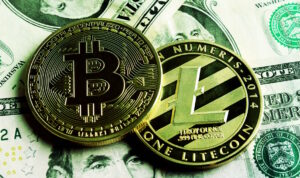In a move highlighting the coming fusion of traditional and crypto financial markets, PayPal has launched a US-Dollar backed stablecoin – PayPal USD (PYUSD).
Launched directly by PayPal, the development adds another dimension to financial markets, potentially transforming payments on the back of weakening USDC usage, and surging Tether dominance.
This development, announced by PayPal directly, adds a new dimension to the emerging landscape of regulated, attested stablecoins in transforming payments in so-called digital-native environments like web3.
In a statement, Paxos CEO Charles Cascarilla said:
“With the launch of the first stablecoin by a leading financial institution, PayPal and Paxos are proving the real-world value of blockchain technology. PayPal USD is the most significant leap forward for digital assets and the financial industry and Paxos is proud to enable this transformative product.”
In February, progress on the project had stalled, with a company representative telling Bloomberg that Paypal was “exploring a stablecoin…If and when we seek to move forward, we will, of course, work closely with relevant regulators.”
PayPal’s PYUSD
PYUSD is a US Dollar stablecoin backed by US Treasuries and cash equivalents, similar to USD Tether. The stablecoin provides a one-to-one redemption for Dollars and will be available to US citizens.
According to the terms listed in the announcement, PYUSD could be the native token for the bank’s crypto services with no “spread” charged on the swaps.
“When you buy or sell cryptocurrency, including when you check out with crypto, we will disclose an exchange rate and any fees you will be charged for that transaction. For currencies other than PayPal USD, the exchange rate includes a spread that PayPal earns on each purchase and sale. PayPal USD is not available in Hawaii.”
The president and CEO of PayPal said the company is committed to innovation and compliance for the stablecoin.
“Our track record delivering new experiences to our customers provides the foundation necessary to contribute to the growth of digital payments through PayPal USD.”
Paypal’s PYUSD is not a decentralised cryptocurrency, but an ERC-20 token issued on the Ethereum blockchain. The token will compete with USDC and other stablecoins, not Bitcoin or Litecoin. Stablecoins are regulated assets that are similar to upcoming central bank digital currencies, only they are privately issued and compete in a marketplace for consumers, merchants and developers. Members of the ethereum community pointed to the inherent problems which technically afflict all stablecoins, underlining the importance of not conflating the assets with decentralised cryptocurrencies that cannot be censored.
So the PayPal stablecoin contract:
– Is written in an extremely old version of Solidity
– Allows the owner to pause all transfers
– Allows the owner to freeze addresses to prevent actions
– Allows admins to increase the total supply at willCentralized, but transparent at least. pic.twitter.com/VJ3Jgj1SJ3
— cygaar (@0xCygaar) August 7, 2023
In 2022, PayPal subjected customers to a controversial policy change that meant users could face a $2,500 penalty for “misinformation”. The move opened the gates to political persecution similar to what Canadian truckers experienced in early 2022 for exercising their right to protest draconian measures under Trudeau’s regime. PayPal has since issued an apology for the notice.
Still, the new stablecoin is anticipated to enable direct payments to developers and artists, and encourage multinational corporations’ ongoing investment in digital assets. Additionally, PayPal USD will work in ‘web3-specific contexts’, and Venmo support is soon to follow.
While it’s not clear what web3 actually means, the buzzword tends to refer to tokenisation of assets, securities offerings, cross-chain bridges and various financial and synthetic assets built on multi-layered blockchains. While nuggets of value could be present, much of this amounts to low liquidity projects that have no practical use-case besides online gambling and rug pulls in progress.
PYUSD transparency and issuance
PayPal USD is overseen by Paxos Trust Company, a licensed limited-purpose trust subject to New York State Department oversight. The exchange rate for PYUSD to the USD is $1.00: $1.00.
Starting in September 2023, Paxos plans to increase transparency by making a public Reserve Report for PayPal USD available that lists the instruments that make up the reserves. The report will have third-party attestation regarding the value of PayPal USD, issued by an independent accounting firm by the standards established by the American Institute of Certified Public Accountants (AICPA). The process is similar to USD Tether attestations.
Besides offering utility services to digital currencies, the company said that it is committed to increasing consumer and merchant understanding of cryptocurrencies, stablecoins, and central bank digital currencies (CBDCs), while actively engaging with regulators as the industry progresses.
Join the telegram channel for updates, charts, ideas and deals.
Did you like the article? Share it!


